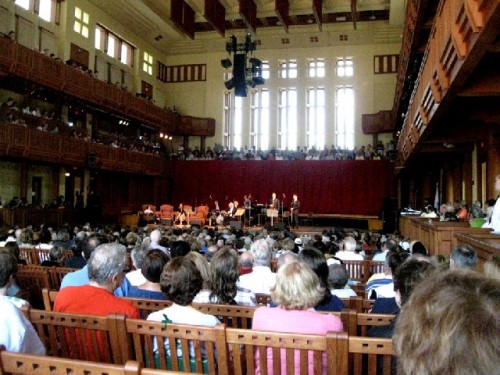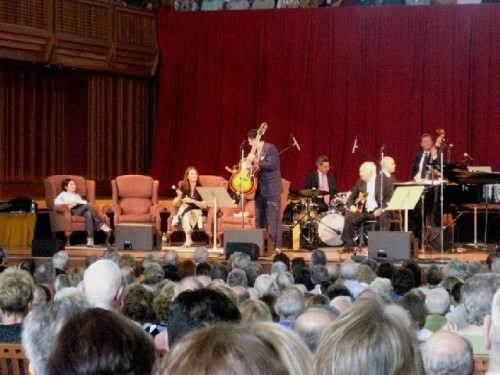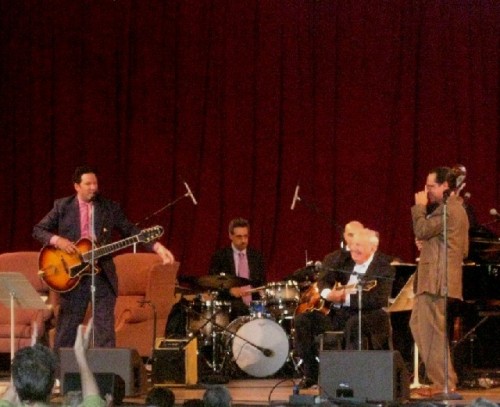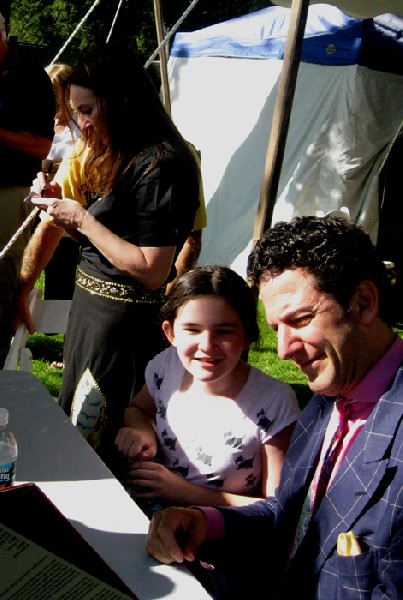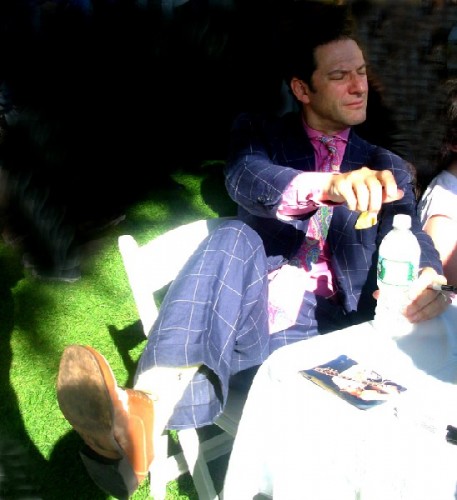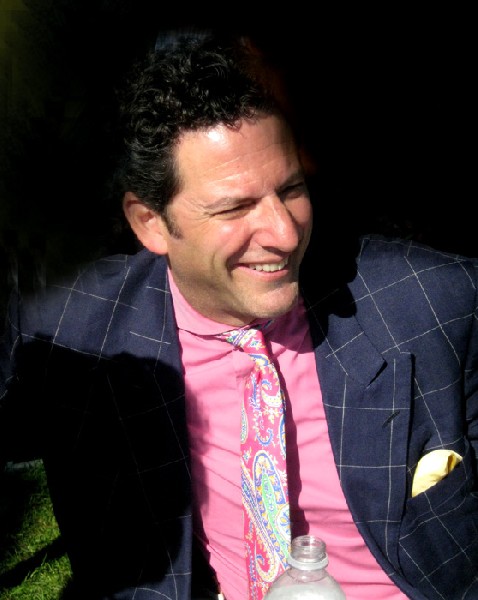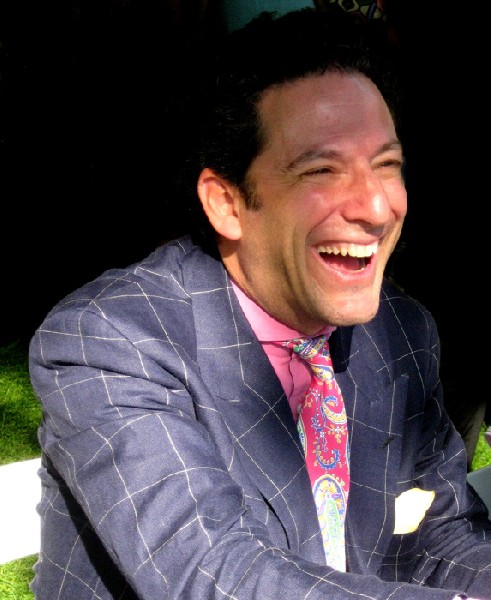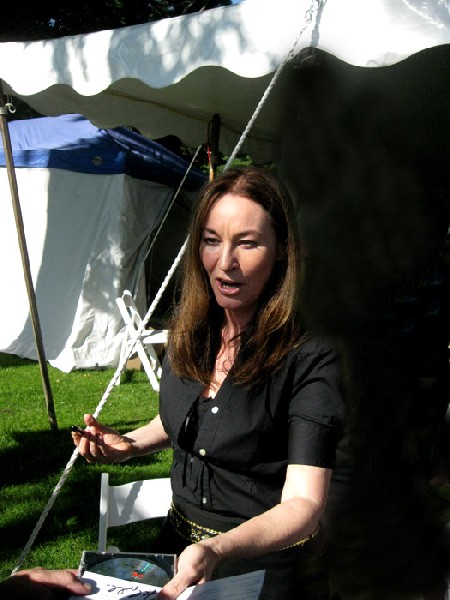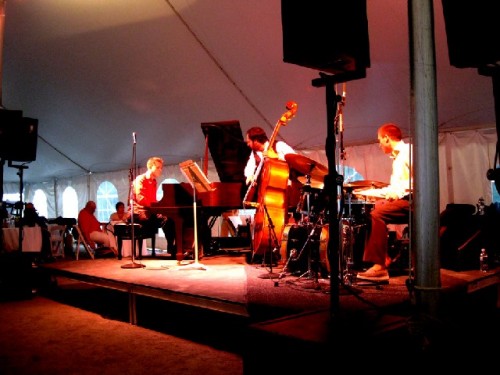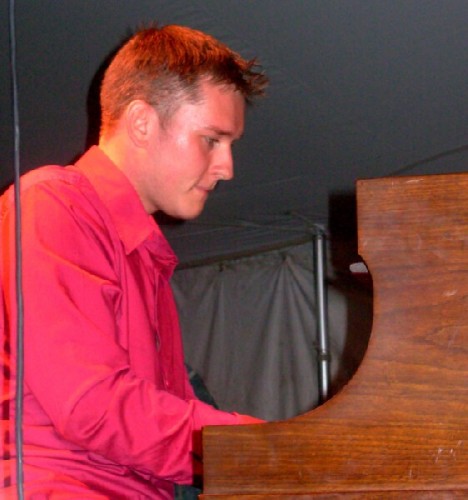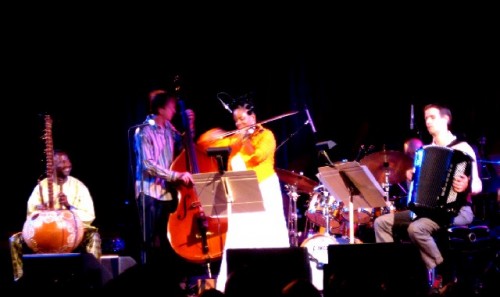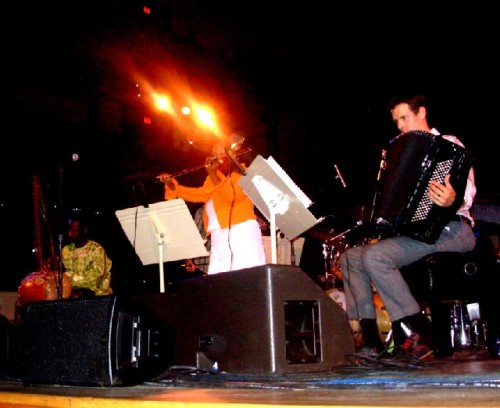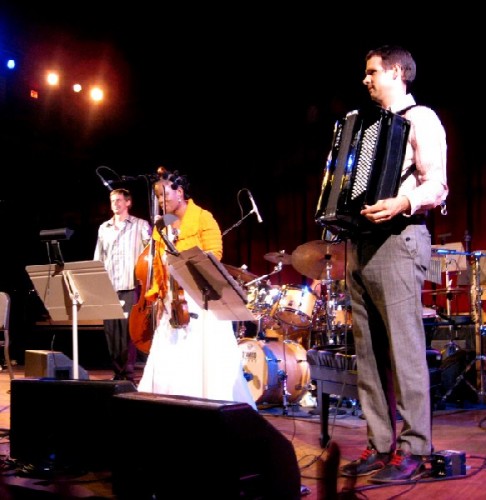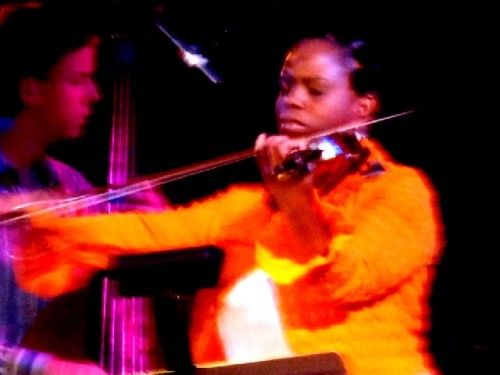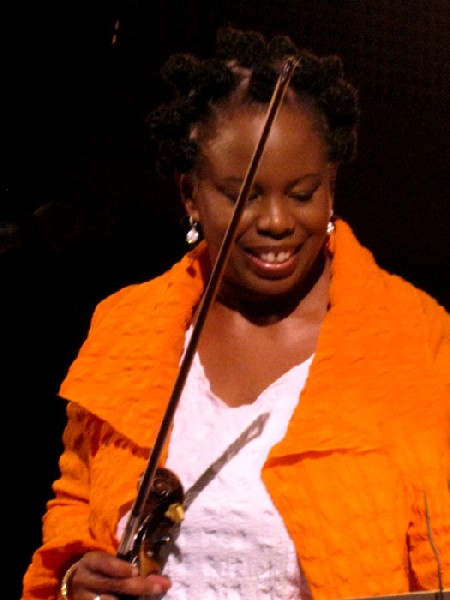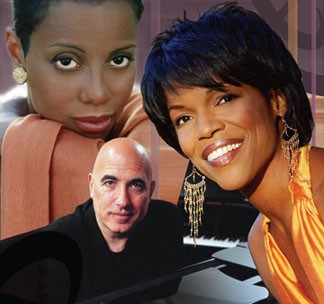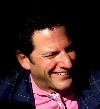Regina Carter, Nnenna Freelon & Harolyn Blackwell at Tanglewood Jazz Festival
John Pizzarelli, Family and Kurt Elling with Radio Deluxe
By: Charles Giuliano - Sep 06, 2009
The second day of the weekend long Tanglewood Jazz Festival was jam packed, with attractive but uneven impact. There was a full house for the afternoon taping of the Radio Deluxe program featuring John Pizzarelli and his wife Jessica Molaskey as hosts. We caught a bit of the Evegny Levedev Trio in the sold out Jazz Café. The evening program started with a magnificent set by the Regina Carter Quintet, followed by an enervating one "Dreaming the Duke," with jazz singer Nnenna Freelon paired with the classical soprano Harolyn Blackwell.
In the past Jazz Festivals the Saturday afternoon concert featured a taping of pianist Marian McPartland's PBS program. It was evident last year that the effort was taxing for the elderly but game performer. For this festival there was a switch for the "at home" broadcast of John Pizzarelli with his wife, the singer Jessica Molaskey, a witty, self described, Irish Catholic from Connecticut as co host. Their daughter Madeline joined in the patter. John also traded quips and riffs with his father, the renowned guitarist, Bucky Pizzarelli. The scat singer, their New York neighbor, Kurt Elling, made an all too brief guest appearance with just two songs during the 90 minute program.
There were several large stuffed chairs on the stage at Ozawa Hall. This is meant to simulate the living room from which they broadcast their weekly show that is carried by radio stations as well as available through their internet site. They have the tag line that the show is coming from "High above Lexington Avenue." But that is now a fib as they have moved to "New digs on River Side Drive." He asked if they should let the audience know about the changes.
As we found out at Symphony Hall, when Pizzarelli performed with the Pops, he is a super guitarist and scat singer. As well as, a great and kinetic entertainer. In the context of this family style home entertainment, however, there was far more talk than music. It evoked a kind of update of the Ozzie and Harriet show. What we encountered was somewhat like a reality sitcom. This family was far too happy and upbeat to be entirely believable. There was hardly a hint at familial or marital strife.
Often Bucky just smiled when John used him as the foil for comedy. Introducing his Dad, for example, he said that he was "Playing his first gig without his gall bladder. At 83 he has been in the music business for 60 years. He has been married to my lovely mother for 54 years. His knees are five years old and without his gall bladder he is playing even better."
You catch the drift. The family style entertainment prevailed through the set interrupted by occasional aspects of music. It was a treat to hear Bucky laying down that swinging strum while John played lead. Over the years many jazz musicians were Bucky's guests. John recalled finding a man sleeping in the bedroom. When he asked Bucky about "who's that guy" the answer was "Oh, that's just Benny (Goodman). He's just taking a nap before he drives home."
Which is amusing but we came expecting a Jazz Festival not pitter patter and a variety show. We had enough of that with Garrison Keillor and his "Prairie Home Companion" which traditionally opens a Tangelwood season. Once was plenty for us. With prolonged exposure it gets to be like an evening of tuba music.
The audience perked up when Kurt Elling came on stage way too late in the program. Last year we enjoyed Elling as a featured performer. Since then, we have played the devil out of his CD's. He played a couple of selections from a new release "Dedicated to You" which he recorded live at Lincoln Center with a string quartet and a rhythm section.
John was so delighted to have Kurt as a guest that he offered to sign over his Tanglewood check. "Is that all you get for a gig" was Elling's retort. It was a refrain that we heard quite often from a variety of performers. Since the money jokes were so common you sensed that budget was a real issue for the Festival. Tight purse strings are inevitable in a year of cutbacks and a poor economy. There is always the risk of bad weather. Last year the Festival was a washout. But with gorgeous sunny days this time the lawn was packed and folks were complaining that they couldn't get into the Jazz Café.
Yet again we were enthralled by Elling as he twisted and turned through "Polka Dots and Moon Beams." He stretches and bends the lyrics and melody of a song. Then Pizzarelli joined Elling to trade scat on "Tea for Two." Both are masters of vocalese or sounds that emulate instruments. It was phenomenal to compare and contrast two masters of the style. It was surely the highlight of the program.
After a dinner break we fell by the tent for a set by the Evgeny Lebedev Trio. One of the perks of the Festival is the opportunity to check out emerging artists. Often these artists are heard at other festivals and return as featured performers. It is a reminder that jazz is a living art form.
Tanglewood authorities cleared the grounds following the afternoon program. The Jazz Café starts at 6:30 pm which is when the gates open. We arrived early and waited until the grounds were opened. By the time we walked up to the tent it was already packed. There was a long line of patrons waiting to get in for dinner and a show. That's a tight window to serve dinner before an 8 PM show. If the Café opened at 5:30 PM more patrons would have been served; perhaps two sets with two seatings. The popularity of the Jazz Café also argues strongly that it would fly as a season long Tanglewood feature.
Once again there appeared to be a full house and dense audience on the lawn for the evening program. The Regina Carter Quintet lived up to the high standards set on the opening night with Paquito d'Rivera.
The set by Carter, a MacArthur Foundation 'genius' fellow, featured her on violin. She was accompanied by Will Holshouser, accordion and arranger, Yocuba Sissoko on korn, a West African stringed instrument, Chris Lightcap on bass, and Alcester Garnett on drums She performed from "Reverse Thread" which will be released later this year.
The intriguing music she performed was gathered in Mali, Madagascar, Senegal and Uganda. Often she expands on very simple traditional sources. Several times we heard a selection of the original music followed by the interpretation of the quartet. It was intriguing that the music was anchored by the European accordion and violin and the West African kora. They played "Intemi" and "Artistia."
Carter introduced a field song from Uganda. It is sung by women while they are working. She translated the lyrics as saying that "This Child Will Never Walk." What it meant is that it is carried by the mother. Playing the original with Ugandan dialect was absorbing. The music that followed expanded on the rhythm and melody. It was fascinating to compare the improvisation to the original tune. Carter's set was delightful.
The feature of the evening was an ambitious project "Dreaming the Duke" based on the music of Duke Ellington. The concept of the arrangers, Bruce Donnelly and pianist, arranger, and musical director, Mike Garson, was to conflate a jazz rhythm section with classical strings. It also contrasted the approach of a jazz singer, Nnenna Freelon, with an operatic soprano, Harolyn Blackwell.
It is an approach that the Duke would likely encourage and enjoy. Ellington was the most ambitious and adventurous composer, arranger and band leader of his generation. He often emulated classical symphonies in his extended compositions starting in 1943-1945 with the suite "Black Brown and Beige." In an era that preceded the LPs he recorded it on several 78 rpm disks. He liked to experiment with instrumentation. Ray Nance, who played trumpet, was often featured on violin. So there were precedents for this project.
Although Ellington featured the singers Ivie Anderson and Al Hibbler his focus was primarily on orchestral music. The Count Basie Band was noted for its many collaborations with singers. Ellington recorded "Black Brown and Beige" again, in 1958, with the Gospel singer, Mahalia Jackson. The most remarkable track is her bone shaking version of "Come Sunday" with a stunning violin interlude by Ray Nance.
We anticipated this performance with great expectation. Surely Ellington is a remarkable treasure trove to work with. The set however, did not start well. There was a long orchestral piece that wandered about aimlessly with the strings trading with sax, trumpet and trombone. It seemed to have little or nothing to do with Ellington until, after an endless excursion, it identified itself as a take on "Perdido." Good grief.
Nennena Freelon is an attractive woman with a lovely, well trained voice. But no feeling or life experience for jazz singing. Her approach seemed too schooled and Ivy League for the earthy emotions conveyed by the gutsy lyrics. Everything was too mannered and studied with little or no spontaneity or chops. It was all style with no substance. Her partner, Harolyn Blackwell, was even further off the mark. That operatic style just seemed misplaced in this context. I shuddered when she sang "Come Sunday" which blanched by comparison to the magnificent original by Mahalia Jackson. The duo of Freelon and Blackwell was all too uptown, Madison Avenue, when we really wanted to "Take the A Train" to Harlem.
The absurdity and self indulgence of pianist, musical director, Mike Garson, decked out in leather and velvet like a rock Nosferatu, just exacerbated the pretentiousness of the arrangements. This was most telling during a duet of the Ellington standard "It Don't Mean a Thing If It Ain't Got That Swing." It didn't.

